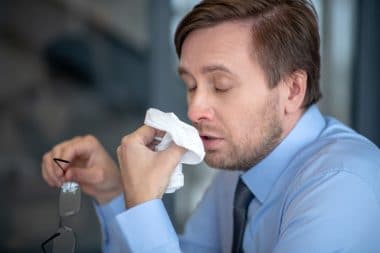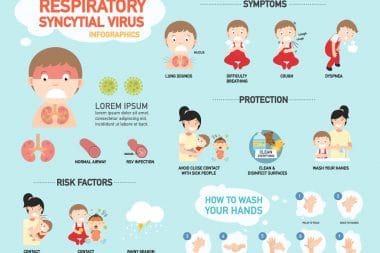Allergies can happen throughout the year. The only time it seems like some people get relief from allergies is in the winter when most things lie dormant. Allergic rhinitis is when your immune system reacts to pollen or whatever allergen it detects as an imposter causing your immune system to overreact.Â
- Allergies usually run in families. If both parents have allergies their child has about a 70% chance of having allergies.Â
- About 8% of all Americans have experienced one type of allergy.Â
- If you are affected by outdoor allergies you may most likely be affected by indoor allergies as well. Â
Common Outdoor Allergens
There are some common outdoor allergens. Tree pollens are very common. Birch is the most common spread of allergies, other trees are cedar, alder, horse chestnut, and willow. Grass pollen can also cause allergies. Weed pollen such as ragweed which is the most common cause of allergies in the fall. Mostly any plant that is wind-pollinated can cause allergies. Mold spores that float in the air during the summer can also cause allergies. During the end of summer, and start of fall can cause hay fever. Hay fever is named for hay cutting season causing lots of things to be blown in the air. Â
Symptoms
Symptoms of allergic rhinitis can vary between people. There is no actual length in how long symptoms will last. That depends on the person. Thankfully with some treatment you may be able to alleviate or get rid of your symptoms.
Symptoms can include runny nose, sneezing, or stuffy nose. It can also cause itchy eyes, roof of mouth, or ears. Your eyes may become red, swollen or watery. You can have ear congestion as well.
Many people who suffer from Allergic rhinitis also have asthma. So asthma symptoms can become intensified as well as there is an increased chance of an asthma attack.
Other not so common symptoms are headache, shortness of breath, wheezing, coughing, and facial pressure. Not everyone will experience all of these.
Prevention
Treatment doesn’t cure Allergic rhinitis. You can do some lifestyle changes to help limit your reactions to the allergens you may have a problem with.Â
The top one is avoidance. Keeping yourself away from the allergen that affects you can be the most beneficial. This can be to try to limit your time outdoors.Â
Keep a watch on pollen counts during the day. Pollen count is usually higher in the morning, so instead of going out in the morning you can switch to more evening activities. Keep windows shut during times when pollen is high. Use an air conditioner unit that uses a HEPA filter.
If you do yard work outside make sure you wash your hands, change your clothes, take a shower and wash your hair to get rid of all pollen off your body. Stay out of dry leaves as much as possible. When working outside make sure you wear protective gloves, long sleeved shirts and pants.
When pollen counts are high and there is a lot of wind, wear a dust mask.
Over the counter antihistamines or decongestants may also help alleviate symptoms that have already presented.
Some people also find that spirulina, vitamin C, or having daily doses of local honey can also help alleviate allergies.
Common Indoor Allergens
If you are affected by outdoor allergens the chances are high for you to be affected by indoor allergens as well. The two most common indoor allergens are dust mites, and pet dander. As well as mold in areas that get too much moisture.Â
If you suffer from indoor allergens there are some things you can do to help those as well.Â
- If your house stays too humid, use a dehumidifier to whisk away excess moisture.Â
- Cover beds and pillows with an allergy-proof protector.Â
- Keep your pets well groomed.Â
- Wash your bedding at least once a week in very hot water.Â
- Vacuum carpets, and remove extra rugs where necessary. If you can, avoiding carpet is really best.Â
- Make sure to keep your house clean and scrub those places that are mold breeding grounds. Â
Takeaway
Most of the year there are usually outdoor allergens that can affect anyone. Allergies are very common and if you have two parents that both suffer from allergies, the chances are very high that you may as well. Allergies are not curable but they are treatable. Once the plants lie dormant for the winter most people get some relief from the outdoor allergens.Â
How allergies affect people is completely different per person as well as how long they will have symptoms once they become in contact. You don’t usually have to see a doctor about allergies, you can usually self diagnose. Only in severe allergy cases will the doctor want to give you allergy shots. Outdoor allergies rarely need allergy testing to see if they are the cause of your symptoms.Â
Keeping an eye on what causes your allergic reactions, and knowing how to best avoid them is the best way to help eliminate your reactions.Â
Outdoor allergies increase the risk of having indoor allergies! #HealthStatus
How allergies affect people is completely different per person as well as how long they will have symptoms once they become in contact.
Sources:
https://www.allergytampa.com/2017/12/01/long-symptoms-allergic-rhinitis-last/
https://www.everydayhealth.com/allergy/indoor-and-outdoor-allergy-differences.aspx
https://www.aaaai.org/Tools-for-the-Public/Conditions-Library/Allergies/Outdoor-allergens-TTR
https://www.zyrtec.com/allergy-guide/outdoors/reduce-outdoor-allergy-triggers
https://www.webmd.com/allergies/outdoor-allergies-in-kids
https://www.healthline.com/health/allergies/seasonal-allergies#treatment
https://www.everlywell.com/blog/indoor-outdoor-allergies/tips-for-managing-allergy-symptoms/









Reply